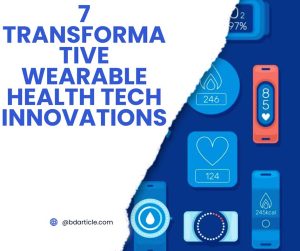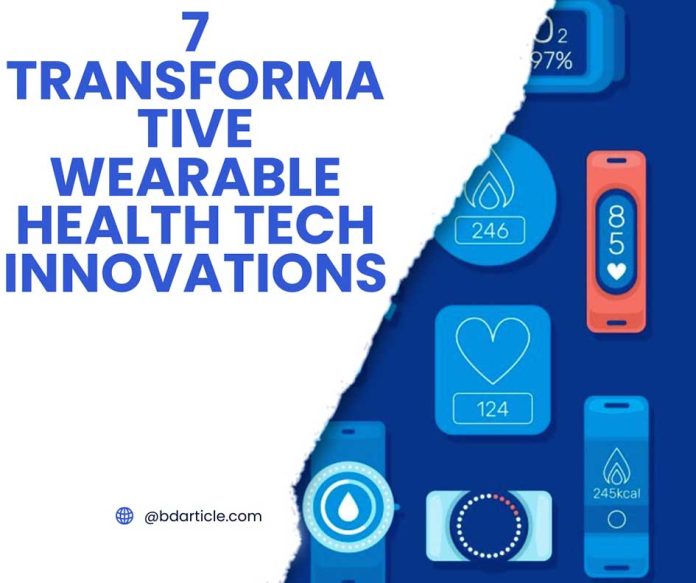Wearable health tech innovations are revolutionizing the way individuals monitor and manage their well-being. These devices, ranging from smartwatches to advanced biosensors, empower users to take control of their health in real time. As technology continues to evolve, wearable health monitoring devices in 2025 are expected to become even more sophisticated, offering unparalleled insights into personal health metrics. This article explores seven transformative innovations that highlight the future of wearable technology in healthcare and its potential to reshape the industry.

Revolutionizing Personalized Health Monitoring
One of the most impactful wearable health tech innovations examples is the ability to provide personalized health data. Devices like the Apple Watch and Fitbit have set the standard for tracking heart rate, sleep patterns, and physical activity. These wearables go beyond basic fitness tracking by offering features such as ECG monitoring and blood oxygen level detection. For individuals managing chronic conditions like hypertension or diabetes, these tools serve as constant companions, alerting them to potential issues before they escalate.
The integration of Artificial Intelligence (AI) into wearable health monitoring devices in 2025 is expected to enhance their capabilities further. AI algorithms can analyze vast amounts of data to identify trends and predict potential health risks. This proactive approach not only improves individual outcomes but also reduces the burden on healthcare systems by preventing unnecessary hospital visits.
Advancing Remote Patient Care
Remote patient care has gained significant traction, especially in the wake of global health challenges. Wearable technology in healthcare includes devices that enable doctors to monitor a patient’s vital signs from a distance. For instance, wearable medical device companies have developed patches that track glucose levels in diabetic patients or detect irregular heart rhythms in cardiac patients. These innovations ensure continuous monitoring without requiring frequent in-person visits.
The future of wearable technology in healthcare lies in its ability to bridge gaps in accessibility. Remote monitoring solutions can immensely benefit patients in rural or underserved areas. By transmitting real-time data to healthcare providers, wearables facilitate timely interventions and improve overall patient outcomes. This shift toward decentralized care aligns with broader trends in digital health transformation.
Enhancing Mental Health Support
Mental health is another critical area where wearable health tech innovations are making strides. Devices equipped with sensors can track physiological indicators of stress, such as heart rate variability and skin conductance. Some wearables even incorporate mindfulness exercises and guided breathing techniques to help users manage anxiety and stress effectively.
Top wearable health devices now include apps that sync with mental health platforms, providing users with actionable insights based on their biometric data. These innovations encourage individuals to adopt healthier coping mechanisms and seek professional help when needed. As awareness around mental health grows, wearable technology in healthcare scholarly articles increasingly emphasizes the role of these devices in fostering emotional resilience.
Addressing Chronic Disease Management
Chronic disease management is a key focus of wearable health tech innovations. Devices designed for long-term use offer continuous monitoring of conditions like asthma, epilepsy, and chronic obstructive pulmonary disease (COPD). For example, smart inhalers equipped with sensors can track medication usage and environmental triggers, helping asthma patients better understand their condition.
Wearable medical device companies are investing heavily in research and development to create products tailored to specific health needs. These innovations not only improve patients’ quality of life but also reduce healthcare costs by minimizing emergency interventions. The future of wearable technology in healthcare hinges on its ability to address unmet needs in chronic disease management.
Exploring the Role of Biosensors
Biosensors represent a groundbreaking advancement in wearable health tech innovations. These miniature devices can be embedded in clothing or worn directly on the skin to measure biomarkers such as hydration levels, lactate concentration, and cortisol. Athletes and fitness enthusiasts benefit from real-time feedback that optimizes performance and prevents injuries.
Beyond sports applications, biosensors hold immense promise for medical diagnostics. Researchers are exploring ways to integrate biosensors into everyday items like contact lenses and bandages, enabling seamless health monitoring. Wearable technology in healthcare scholarly articles often highlights the potential of biosensors to transform preventive medicine by detecting early warning signs of illness.
Navigating Challenges and Limitations
While wearable health tech innovations offer numerous benefits, they also come with disadvantages of wearable technology in healthcare. Privacy concerns remain a significant hurdle, as sensitive health data collected by these devices could be vulnerable to breaches. Ensuring robust cybersecurity measures is essential to protect user information and maintain trust.
Another challenge is the accuracy of data provided by some wearables. Inconsistent readings or false alarms can lead to unnecessary anxiety or misinformed decisions. To address this issue, manufacturers must prioritize rigorous testing and validation processes. Bootstrapping Vs Venture Capital Pros and Cons become relevant here, as funding sources influence the pace and quality of innovation in this space.
Envisioning the Future Landscape
The future of wearable technology in healthcare is poised to expand beyond individual use cases into broader societal applications. Smart cities may leverage wearable data to optimize public health initiatives, while workplaces could adopt wearables to promote employee wellness. Collaborations between wearable medical device companies and healthcare providers will drive advancements in interoperability and data sharing.
As we approach 2025, wearable health monitoring devices are expected to become more affordable and accessible, reaching diverse populations worldwide. Innovations such as non-invasive glucose monitors and wearable ultrasound devices demonstrate the limitless possibilities of this field. By addressing current limitations and embracing emerging technologies, wearable health tech innovations will continue to redefine the boundaries of healthcare.
Empowering Individuals Through Technology
Wearable health tech innovations empower individuals to take charge of their health journey. Whether it’s monitoring daily activity, managing chronic conditions, or supporting mental well-being, these devices offer practical solutions that fit seamlessly into modern lifestyles. Top wearable health devices are no longer luxury gadgets but essential tools for proactive health management.
By staying informed about wearable technology in healthcare examples and advancements, users can make educated decisions about incorporating these tools into their routines. The collective efforts of researchers, developers, and healthcare professionals ensure that wearable health tech remains at the forefront of innovation, paving the way for a healthier future.
Start exploring the transformative potential of wearable health tech today and discover how these innovations can enhance your well-being. With continuous improvements and expanding applications, the possibilities are truly endless.

